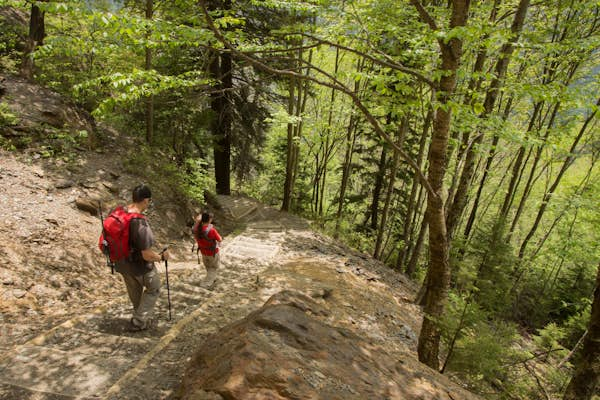With each season, you’ll experience a new and magical side of Great Smoky Mountains National Park. Whether popping with wildflowers in the springtime or exuding the most vivid shades of oranges and reds in September and October, you can embark on the same hike(s) year-round and always be left mesmerized by a different perspective.
The most visited national park in the United States, recent years have seen 14 million-plus annual visitors, with hiking being a quintessential experience. While a drive along Newfound Gap Road or The Foothills Parkway will inspire, hikes in the Smoky Mountains get you up close and personal with caves, critters (just don’t get too close to the black bears) and access to the park’s sole lodging option.
There are 150 trails within the park with varying degrees of difficulty, scenery and resources. Amid all the options, here are our top six hikes in Great Smoky Mountains National Park.

1. Mt. Sterling via Baxter Creek Trail
Best hike for hiking pros
11.7 miles (18.8km) roundtrip, 8-9 hours, strenuous
Soaring 5,842 feet, climbing this North Carolina mountain is considered one of the top experiences within Great Smoky Mountains National Park. To access the deep forest-filled Baxter Creek Trail, head to the Big Creek Ranger Station / Cataloochee Campground. From there, it is an unrelenting steady climb, where you’ll traverse a steel footbridge and pass a variety of towering champion trees – some of the largest in the park.
At the top of Mt. Sterling, you’ll find a nearly 90-year-old fire tower that was once utilized to keep watch over the vast forest below. Fun fact: it has the highest elevation of any fire tower left standing in the eastern United States. And, yes, you can climb in it. It makes the perfect spot to eat whatever meal you’ve packed.
2. Low Gap Trail to Mount Cammerer
Best hike for panoramic mountain vistas
11.5 miles (18.6km) roundtrip, 7-8 hours, strenuous
With rigid switchbacks, towering hardwoods and a stretch of the Appalachian Trail, this strenuous hike has so much Smoky goodness packed into a single experience. The Low Gap Trail itself is situated near the park’s northeast corner near the town of Cosby. Count on traversing dirt-meets-rock ridges and valleys aplenty during this 3000-foot-plus jaunt.
The final half-mile or so is steep and strenuous but is worth it in the end. At the peak of the trail is a historic stone fire tower dating back to the 1930s. From the tower – which is octagonal in shape – you can see the Big Creek hydro-electric plant, Mount Sterling, Snowbird Mountain and lines of smaller peaks aplenty.

3. Alum Cave Trail to Mount LeConte
Best hike for taking in the most Smoky Mountains landscapes
11 miles (17.7km) roundtrip, 7-8 hours, moderately strenuous
Arguably the most popular day hike in Great Smoky Mountains National Park, this easy-to-find trail has it all. Starting just off a large parking lot approximately seven miles south of Sugarlands Visitors Center, you’ll pass under Arch Rock en route to Inspiration Point, which absolutely lives up to its name with vistas of Little Duck Hawk Ridge and beyond. And, yes, there is a cave – Alum Cave itself makes for a nice reprieve and photo op.
Past the cave and en route to Mt LeConte, you’ll find LeConte Lodge, the only lodging option within park boundaries. The lodge – comprising a handful of wooden cottages – is open from mid-March through mid-November. You’ll want to book your reservation as early as possible (up to a year in advance) as it’s a popular spot!
4. Davenport Gap to Max Patch Road
Best hike for an overnight adventure
13.2 miles (21.2km) one-way, 2-3 days, moderately strenuous
Take a weekend for this lengthy and challenging jaunt. Among the highlights, you’ll trek up more than 2500 feet of Snowbird Mountain, navigate a set of towering stone stairs, duck below lengthy lines of canopy trees, coast through flat meadows and tiptoe along dirt roads with steep edges nearby. It has it all.
There is a campsite near the top of Max Patch but do keep an eye on local orders as it has been temporarily shuttered in recent years. There are two campsites nearby that operate seasonally as more reliable options, Harmon Den Horse Campground and Rocky Bluff Campground. However many days you plan for this hike, bring water as the streams can be scarce during drier times.

5. Laurel Falls Trail
Best hike for families
2.4 miles (3.9km) roundtrip, 1-2 hours, easy
With a trailhead that’s less than four miles from the Sugarlands Visitor Center, this asphalt trail is easy to get to and easy to navigate. Once you park, it’s a steady, windy 1.2-mile climb surrounded by rocky terrain and, toward the end, the Laurel Branch Stream trickling below. There are a few spots on the Laurel Falls trail where the asphalt is in rough shape, so bring your all-terrain stroller if you have one. At the end of the hike is a cement bridge splitting two unique falls. If you’re lucky, you’ll snag the sole wooden bench overlooking it all for a family photo or two.
6. Gatlinburg Trail
Best hike to bring your dog, or bicycle, on
1.9 miles (3.1km) one-way, 1 hour, easy
Unfortunately, dogs are not allowed within Great Smoky Mountains National Park… with the exception of two walking paths: the Oconaluftee River Trail and the Gatlinburg Trail. These are the only two paths you can bicycle on, too. While easy, Fido will surely get a workout and be entertained by this moderately hilly experience, including a pedestrian footbridge, adjacent river banks and even chimneys remaining from prior homesites.
